新人教版英语八年级下unit-2教学案
人教版初中八年级英语下册第二单元Unit 2 教案含教学反思
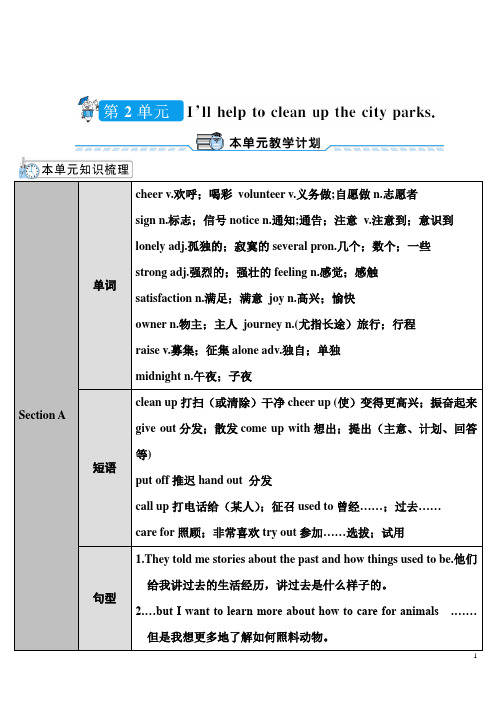
Section A 单词cheer v.欢呼;喝彩volunteer v.义务做;自愿做n.志愿者sign n.标志;信号notice n.通知;通告;注意v.注意到;意识到lonely adj.孤独的;寂寞的several pron.几个;数个;一些strong adj.强烈的;强壮的feeling n.感觉;感触satisfaction n.满足;满意joy n.髙兴;愉快owner n.物主;主人journey n.(尤指长途)旅行;行程raise v.募集;征集alone adv.独自;单独midnight n.午夜;子夜短语clean up打扫(或清除)干净cheer up (使)变得更高兴;振奋起来give out分发;散发come up with想出;提出(主意、计划、回答等)put off推迟hand out 分发call up打电话给(某人);征召used to曾经……;过去……care for照顾;非常喜欢try out参加……选拔;试用句型1.They told me stories about the past and how things used to be.他们给我讲过去的生活经历,讲过去是什么样子的。
2.…but I want to learn more about how to care for animals.……但是我想更多地了解如何照料动物。
句型1.I’m sure you know that this group was set up to help disabled people like me.我确定你知道这个团体是为了帮助像我这样的残疾人而建立的。
2.You helped to make it possible for me to have Lucky.有了你的帮助,我才有可能拥有“幸运儿”。
3.I’ll send you a photo of him if you like,and I could show you how he helps me.如果你喜欢,我会把它的一张照片寄给你,并可以让你看看它是怎样帮助我的。
人教版八年级英语下册教案:Unit 2 第2课时
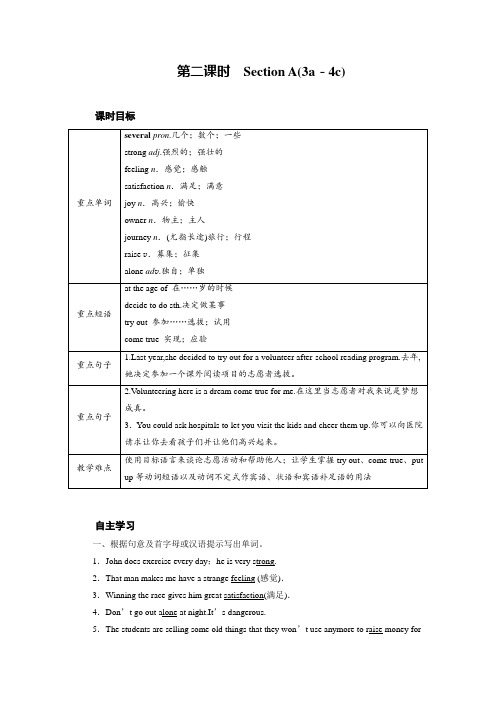
第二课时Section A(3a-4c)课时目标自主学习一、根据句意及首字母或汉语提示写出单词。
1.John does exercise every day;he is very strong.2.That man makes me have a strange feeling (感觉).3.Winning the race gives him great satisfaction(满足).4.Don’t go out alone at night.It’s dangerous.5.The students are selling some old things that they won’t use anymore to raise money forpoor children.二、写出下列画线短语的汉语意思。
1.She could read by herself at the age of four.在……岁的时候2.Mario loves animals and wants to be an animal doctor.兽医3.She decided to try out for a volunteer after-school reading program.参加……选拔;试用4.Volunteering here is a dream come true for me.实现5.I can do what I love to do and help others at the same time.同时教学过程环节1新课导入让学生听写以下短语,然后教师订正答案。
(教师可邀请两名学生到黑板前听写)打扫(或清除)干净________(使)变得高兴;振奋起来________分发;散发________想出;提出(注意、计划、回答等)________推迟________分发________打电话给(某人);征召________曾经……;过去……________照顾;非常喜欢________设计意图:温故知新,通过听写任务帮助学生记忆上堂课所学的短语,有利于知识间的衔接,便于老师循序渐进地开展教学。
Unit2How often do you exercise_ Section A 教学设计与反思

Unit2 Section A Grammar Focus-3cFrom(内容来源):2013年人教版八年级英语Time(时间):Sept. 6thTopic(课题):Unit 2 How often do you exercise?Section ALesson Type(课型):New LessonLearners(授课对象):The Students from Grade 8Teacher(授课老师):Li ChunfangLearning aims made by(目标确立的依据):1.课程标准要求1)能识别不同句式的语调,如陈述句疑问句和指令等。
2)能就熟悉的话题进行简单的交流。
3)能正确的朗读课文。
2. 学情分析八二班孩子英语基础薄弱,班级没有尖子生,中等生和中等偏下学生是主力军,中等偏下学生比例占全班的30%以上。
所以教学内容设计以基础和重点为主,拓展为辅。
3.教材分析Unit 2 Section A Grammar Focus-3c 重点讲解用频度副词及一般现在时谈论周末活动,要求学生掌握学习目标中的基本短语,以及重点句型。
Learning aims(学习目标):1) 能掌握以下单词以及短语:hardly ever, maybe, least, at least,能掌握以下句型:① —What does he do on weekends? —He usually watches TV.① —How often do you watch TV? —I watch TV every day.① —Does he go shopping? —No, he never go shopping.2) 能了解以下语法:频度副词及一般现在时简单谈论周末活动情况。
教学重点:1) 对6个频度副词细微差异的理解及使用。
2) 弄清一般现在时在不同人称下动词形式及提问的变化。
教学难点:1) 第三人称单数谓语动词在此核心句型中的运用。
人教版英语八年级下册 Unit 2 I'll help to clean up the city parks

Unit 2 I’ll help to clean up the city parks.Section A 第1课时(1a〜2d)自主学习方案1. 自学生词,并记住拼读及拼写。
2. 预习课本,找出重点短语及句子。
3. 读记后完成自学导练作业。
课堂导学方案Step 1情景导入T:Do you know a volunteer? Do you know what the volunteers do?S1:They help the old people.S2:They help do some cleaning.…T :What can you do? Now please talk about the questions in groups.环节说明:由志愿者的活动过渡到学生讨论的话题,衔接自然,学生易于接受,能勾起学生的学习欲望。
Step 2完成教材1a—1c的任务1. 认真观察1a中的图片,写出图片中帮助他人的方法,然后写出其他帮助他人的方式。
完成后小组内交流看谁写得多。
2. 认真阅读1b中的句子,然后听听力完成1b任务。
3. 再听一遍录音,并跟读对话。
4. 结对练习1a图片中的对话,并请一些学生表演出他们的对话。
然后模仿1b材料编新的对话并表演。
5. 小结训练。
( B )I took my sister to the concert to .A. c heer up her B . cheer her upC . cheer she up D. cheer up she环节说明:听说结合,第一时间向学生传达语言目标,通过结对对话练习和小结训练,使语言目标得以强化。
Step 3 完成教材2a—2c的任务1. 认真观察2a中的图片,然后听录音圈出他们打算要做的事情。
2. 再听一遍录音,根据录音内容完成2b中的填空,然后大声地朗读五个句子。
3. 听第三遍录音,学生跟读,然后仿照2c的形式编对话。
Step 4 完成教材2d的任务1. 学生自读对话,回答下面的问题。
2020年春人教新目标英语八年级下册Unit2-全单元教案
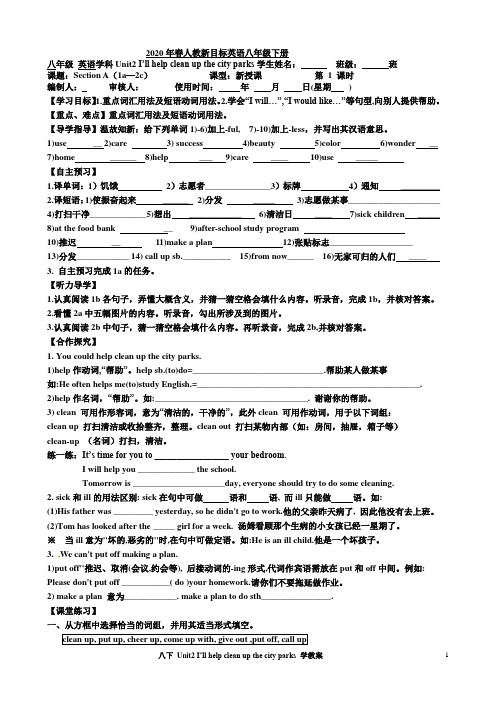
2020年春人教新目标英语八年级下册八年级英语学科Unit2 I’ll help clean up the city parks学生姓名:班级:班课题:Section A(1a—2c)课型:新授课第1 课时编制人:审核人:使用时间:年月日(星期)【学习目标】1.重点词汇用法及短语动词用法。
2.学会“I will…”,“I would like…”等句型,向别人提供帮助。
【重点、难点】重点词汇用法及短语动词用法。
【导学指导】温故知新:给下列单词1)-6)加上-ful, 7)-10)加上-less,并写出其汉语意思。
1)use __ 2)care 3) success 4)beauty 5)color 6)wonder __ 7)home ______ 8)help ___ 9)care ____ 10)use _____【自主预习】1.译单词:1)饥饿2)志愿者_______________3)标牌4)通知_________2.译短语:1)使振奋起来______ 2)分发_____ 3)志愿做某事_____________________ 4)打扫干净_____________5)想出____________ 6)清洁日____ 7)sick children _____ 8)at the food bank __ 9)after-school study program10)推迟__ 11)make a plan 12)张贴标志___________________13)分发____________ 14) call up sb.___________ 15)from now______ 16)无家可归的人们____ 3. 自主预习完成1a的任务。
【听力导学】1.认真阅读1b各句子,弄懂大概含义,并猜一猜空格会填什么内容。
听录音,完成1b,并核对答案。
2.看懂2a中五幅图片的内容。
听录音,勾出所涉及到的图片。
2020年春人教新目标英语八年级下册Unit2全单元教案(无答案)
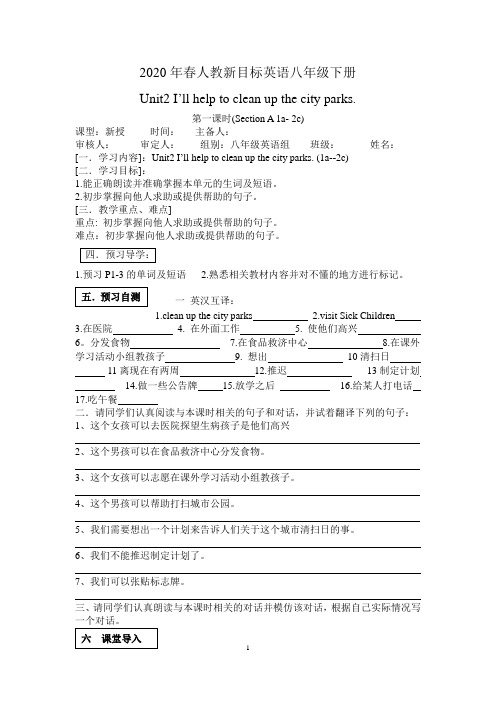
2020年春人教新目标英语八年级下册Unit2 I’ll help to clean up the city parks.第一课时(Section A 1a- 2c)课型:新授时间:主备人:审核人:审定人:组别:八年级英语组班级:姓名:[一.学习内容]:Unit2 I’ll help to clean up the city parks. (1a--2c)[二.学习目标]:1.能正确朗读并准确掌握本单元的生词及短语。
2.初步掌握向他人求助或提供帮助的句子。
[三.教学重点、难点]重点: 初步掌握向他人求助或提供帮助的句子。
难点:初步掌握向他人求助或提供帮助的句子。
1.预习P1-3的单词及短语2.熟悉相关教材内容并对不懂的地方进行标记。
一英汉互译:1.clean up the city parks2.visit Sick Children3.在医院4. 在外面工作5. 使他们高兴6。
分发食物7.在食品救济中心_____8.在课外学习活动小组教孩子9. 想出10清扫日______ 11离现在有两周_____12.推迟13制定计划__ ____ 14.做一些公告牌15.放学之后16.给某人打电话17.吃午餐二.请同学们认真阅读与本课时相关的句子和对话,并试着翻译下列的句子:1、这个女孩可以去医院探望生病孩子是他们高兴2、这个男孩可以在食品救济中心分发食物。
3、这个女孩可以志愿在课外学习活动小组教孩子。
4、这个男孩可以帮助打扫城市公园。
5、我们需要想出一个计划来告诉人们关于这个城市清扫日的事。
6、我们不能推迟制定计划了。
7、我们可以张贴标志牌。
三、请同学们认真朗读与本课时相关的对话并模仿该对话,根据自己实际情况写一个对话。
让学生小组回忆以前所学的有关于委婉(一)教学步骤1. 解读学习目标,学习新词汇2.教师通过玩游戏”Touch your ---”,然后引出询问向他人求助或提供帮助的句子:A: I like reading books.What could you do? B:You could volunteerin an after-school study program to teach kids. (选出写的好的小组进行加分)并核查预习案3.给学生5分钟的时间,让他们模仿1a中的短语进行相互问答练习并把他们编的对话写下来,听听力完成1 b,然后进行相互问答练习。
2020春人教版八年级英语下册教案设计:Unit 2 Section B(2a-2e)

第四课时Section B(2a-2e)错误!未指定书签。
课时目标错误!未指定书签。
自主学习一、根据句意及汉语提示写出单词。
1.We should try our best to help disabled(残疾的)people.2.A blind(失明的)person can not see anything.3.I can hardly imagine(想象)such a scene.4.Jack is brave enough to face all the difficulties(困难).5.I am excited(激动的)about the idea of climbing mountains this weekend.二、写出下列画线短语的汉语意思。
1.I’m sure you know that this group was set up to help disabled people like me.建起;设立2.Lucky makes a big difference to my life.对……产生重大影响3.Then one day last year,a friend of mine helped me out.帮助……解决困难错误!未指定书签。
教学过程环节1新课导入1.Greetings.2.Ask students to look at the two pictures.Question:What can you do to help them?设计意图:以情境导入和图片展示的直观形式进行教学,引入本课时的话题,能够迅速抓住学生的眼球,激起学生的学习兴趣。
环节2学习2a-2e1.结对练习。
学生两人一组,讨论自己一般是怎么感谢他人帮助的。
教师邀请几名学生分享自己的观点。
2.让学生快速浏览2b中信的内容,掌握其主旨大意。
3.让学生浏览2b的两个问题,然后带着问题再次阅读短文,完成练习。
人教版八年级英语教案-Unit 2 How often do you exercise
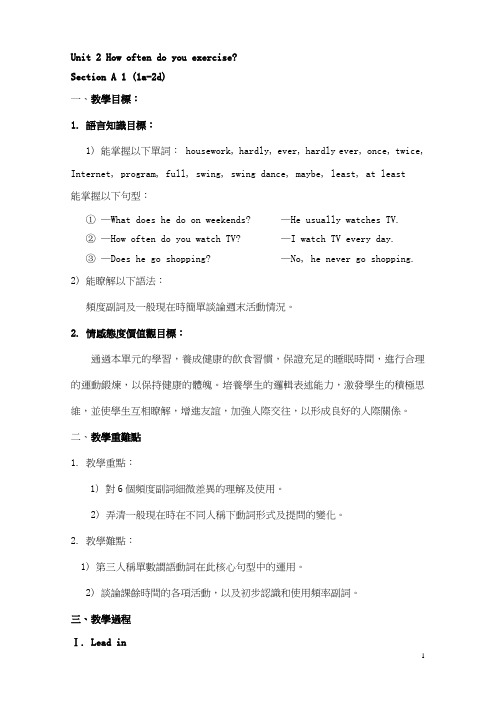
Unit 2 How often do you exercise?Section A 1 (1a-2d)一、教學目標:1. 語言知識目標:1) 能掌握以下單詞: housework, hardly, ever, hardly ever, once, twice, Internet, program, full, swing, swing dance, maybe, least, at least能掌握以下句型:① —What does he do on weekends? —He usually watches TV.② —How often do you watch TV? —I watch TV every day.③ —Does he go shopping? —No, he never go shopping.2) 能瞭解以下語法:頻度副詞及一般現在時簡單談論週末活動情況。
2. 情感態度價值觀目標:通過本單元的學習,養成健康的飲食習慣,保證充足的睡眠時間,進行合理的運動鍛煉,以保持健康的體魄。
培養學生的邏輯表述能力,激發學生的積極思維,並使學生互相瞭解,增進友誼,加強人際交往,以形成良好的人際關係。
二、教學重難點1. 教學重點:1) 對6個頻度副詞細微差異的理解及使用。
2) 弄清一般現在時在不同人稱下動詞形式及提問的變化。
2. 教學難點:1) 第三人稱單數謂語動詞在此核心句型中的運用。
2) 談論課餘時間的各項活動,以及初步認識和使用頻率副詞。
三、教學過程Ⅰ. Lead inTalk about your last weekend’s activities.Ⅱ. Presentation(1) 教師問:“W hat do you usually do on weekends ? ” (並且板書)讓學生根據自己的實際回答I usually …… on weekends.(2) 教師出示動詞卡片 watch TV,read books,exercise,swimplay football、go shopping、 go to movies讓學生回答。
八年级英语下册(人教版)Unit2单元整体优秀教学案例
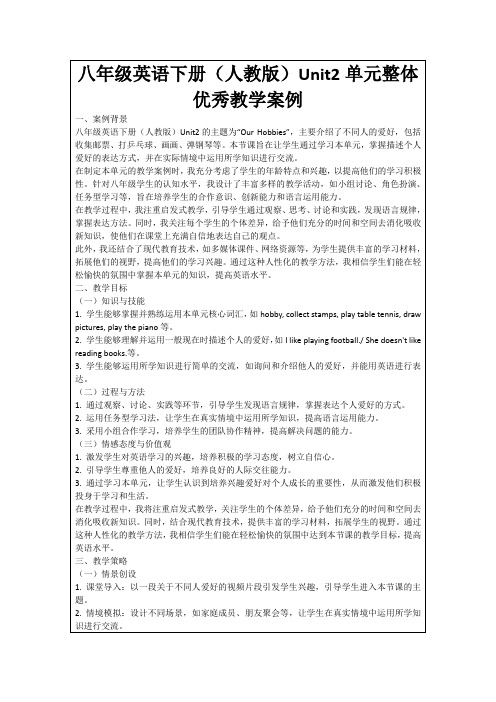
(一)导入新课
1.课堂起始,我将以一个有趣的问题引导学生思考:“同学们,你们有自己的爱好吗?能分享一下吗?”让学生自由发言,谈论自己的兴趣爱好。
2.紧接着,我会展示一段关于不同人爱好的视频片段,如收集邮票、打乒乓球、画画等,引导学生关注本节课的主题。
3.然后,我会向学生介绍本节课的学习目标,让他们明确本节课需要掌握的知识和技能。
二、教学目标
(一)知识与技能
1.学生能够掌握并熟练运用本单元核心词汇,如hobby, collect stamps, play table tennis, draw pictures, play the piano等。
2.学生能够理解并运用一般现在时描述个人的爱好,如I like playing football./ She doesn't like reading books.等。
2.合作完成任务:学生分组完成相关任务,如制作关于爱好的海报、编写对话等。
3.小组互评:学生相互评价,给出建议和意见,共同提高。
(四)反思与评价
1.学生自我反思:让学生回顾本节课的学习过程,总结自己的收获和不足。
2.同伴评价:学生相互评价,给出建议和意见,促进共同进步。
3.教师评价:教师对学生的学习过程和成果进行评价,给予鼓励和指导。
(二)讲授新知
1.通过PPT展示本节课的核心词汇,如hobby, collect stamps, play table tennis等,并引导学生跟读,确保他们正确掌握这些词汇。
2.接着,我会运用一般现在时引导学生描述个人爱好,如“I like playing football.”“She doesn't like reading books.”等,并让学生进行模仿练习。
人教版英语八年级下册 Unit2_SectionB(2a-2e)教案
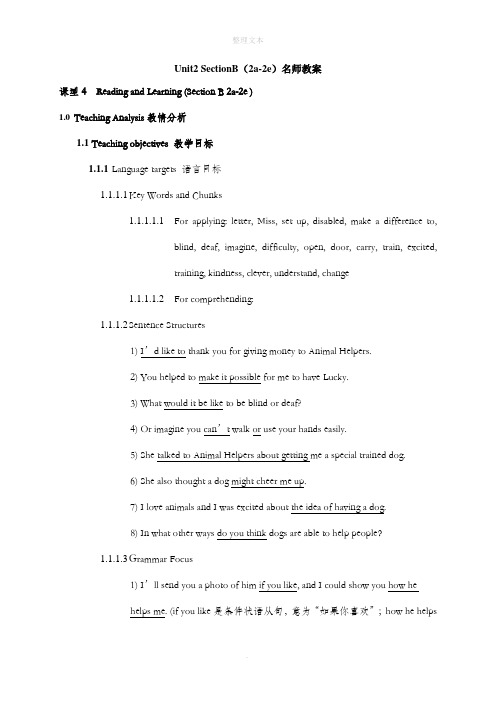
Unit2 SectionB(2a-2e)名师教案课型4 Reading and Learning (Section B 2a-2e )1.0Teaching Analysis教情分析1.1Teaching objectives 教学目标1.1.1Language targets 语言目标1.1.1.1Key Words and Chunks1.1.1.1.1For applying: letter, Miss, set up, disabled, make a difference to,blind, deaf, imagine, difficulty, open, door, carry, train, excited,training, kindness, clever, understand, change1.1.1.1.2For comprehending:1.1.1.2Sentence Structures1) I’d like to thank you for giving money to Animal Helpers.2) You helped to make it possible for me to have Lucky.3) What would it be like to be blind or deaf?4) Or imagine you can’t walk or use your hands easily.5) She talked to Animal Helpers about getting me a special trained dog.6) She also thought a dog might cheer me up.7) I love animals and I was excited about the idea of having a dog.8) In what other ways do you think dogs are able to help people?1.1.1.3Grammar Focus1) I’ll send you a photo of him if you like, and I could show you how hehelps me. (if you like是条件状语从句,意为“如果你喜欢”;how he helpsme是宾语从句,意为“他如何帮助我”)2) I’m su re you know that this group was set up to help disabled people likeme. (was set up是一般过去式的被动语态,一般过去时的被动语态的结构为“was/were+动词过去分词”)1.1.2Ability goals 能力目标1.1.2.1帮助学生通过单词的词性来帮助理解单词在句中的含义。
八年级英语下册Unit2I’llhelptocleanupthecityparks第4课时SectionB2a_2e教案新版人教新目标版
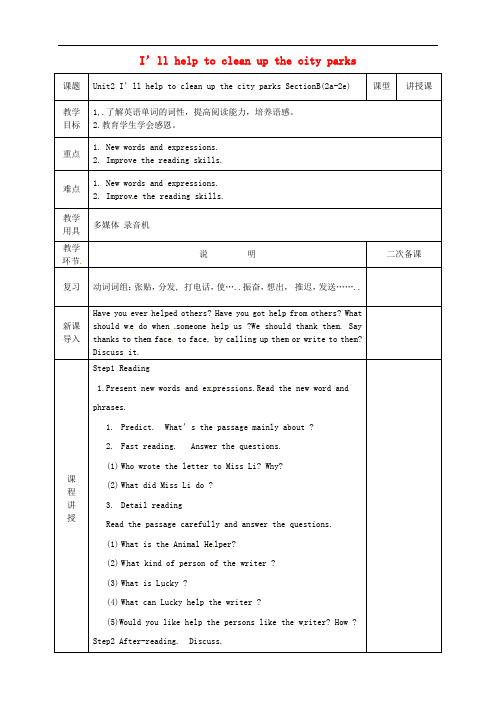
Talk about your hometown.
Where is your hometown?
Do you like your hometown?
What are some of the special places in your hometown?
Step 3Group work
1a,Check (√) the places or things you can find in your town or city.
First let the students go through the words .
Check the answers and read the words aloud.
especially副词,意为“尤其;特别;格外”,在句中作状语,用于列举某个特例或某事物的特殊性。形容词为special“特别的,特殊的”。
8. consider动词,意为“考虑”,=think about,后跟名词,代词,动名词,宾语从句或“疑问词+不定式”。
9. in my opinion
2b,Find expressions in the passage that have the same meanings as these words and phrases.
1. look forsearch for5. go backreturn
2. considerregard6. changesdevelopments
3. across fromopposite7. areaplace
4. in one’s opinionaccording to
Then read the words and phrases aloud
新人教版八年级英语下册Unit2-I'll-help-to-clean-up-the-city-parks教案
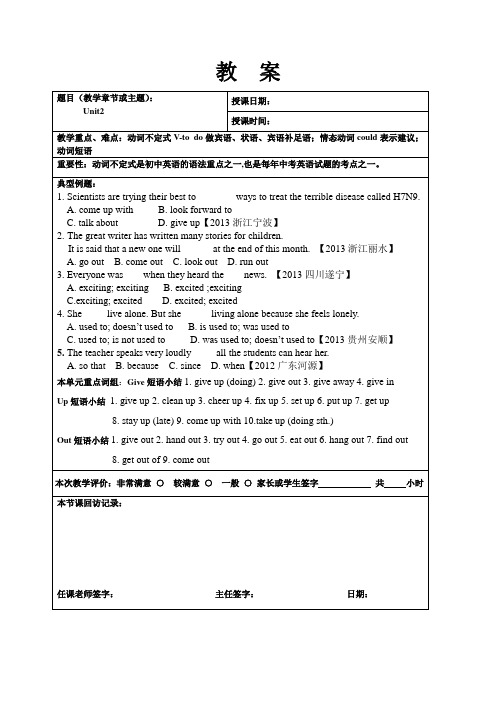
教案讲义学生:任课教师:例:Several boys were injured. 有几个小伙子伤了。
My friend speaks several languages. 我的朋友能讲几种语言11. Last year, she decided to try out for a volunteer after-school reading program.去年,她决定尝试在一个课后阅读项目中做一名志愿者。
【解析】try out 尝试;实验【拓展】try on 试穿①We should __________________(尽最大努力)to be happy in the future.②We should try ___ much fruit.A. eatB. to eatC. eatingD. eats12. care for sb./sth.照顾;照料care【名词】小心,关心;take care of = look after →【动词】care about sb./sth.关心,在意某人/事例:Many students in our school _______ the old and they usually offer their seats to them on buses. A.worry about B. care for C. agree with D. take care【拓展】care的短语总结take care =be careful v.当心,小心;take care of =look after v.照顾,照料,照看take care of 处理,做完练习:Thanks for your invitation, but I’m so sorry I can’t go. I need to ______ my baby at home. A. take away B. take off C. take care of D. take out of13. But I want to learn more about how to care for animals...但是我想学习更多的关于如何照顾动物的知识【解析】―疑问词+不定式‖作及物动词的宾语,【记】:I don’t know what to do.I don’t know how to do it. I don’t know what to do with it.【拓展】v+up with构成的短语:catch up with赶上;追上;put u with容忍;忍得住;keep up with 跟上;跟、保持联系end up with 结束;以.......而结束17.They told me stories about the past and how things used to be.他们给我讲过去的故事,并告诉我过去事情是什么样子的。
人教版八年级英语下册Unit2全单元教案
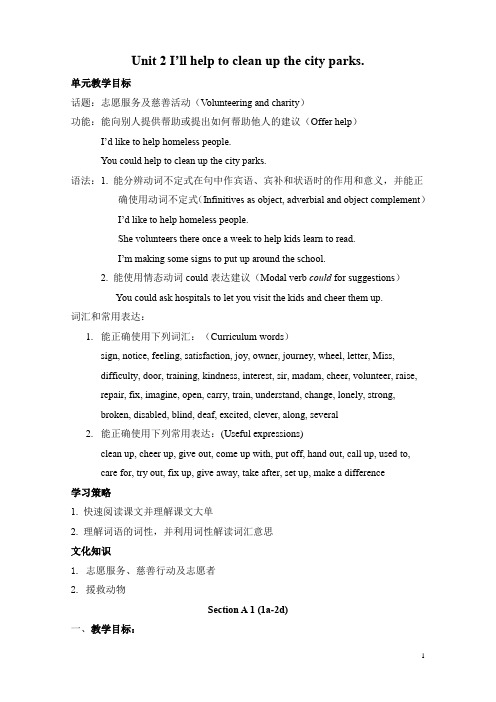
Unit 2 I’ll help to clean up the city parks.单元教学目标话题:志愿服务及慈善活动(V olunteering and charity)功能:能向别人提供帮助或提出如何帮助他人的建议(Offer help)I’d like to help homeless people.You could help to clean up the city parks.语法:1. 能分辨动词不定式在句中作宾语、宾补和状语时的作用和意义,并能正确使用动词不定式(Infinitives as object, adverbial and object complement)I’d like to help homeless people.She volunteers there once a week to help kids learn to read.I’m making some signs to put up around the school.2. 能使用情态动词could表达建议(Modal verb could for suggestions)You could ask hospitals to let you visit the kids and cheer them up.词汇和常用表达:1.能正确使用下列词汇:(Curriculum words)sign, notice, feeling, satisfaction, joy, owner, journey, wheel, letter, Miss,difficulty, door, training, kindness, interest, sir, madam, cheer, volunteer, raise,repair, fix, imagine, open, carry, train, understand, change, lonely, strong,broken, disabled, blind, deaf, excited, clever, along, several2.能正确使用下列常用表达:(Useful expressions)clean up, cheer up, give out, come up with, put off, hand out, call up, used to,care for, try out, fix up, give away, take after, set up, make a difference学习策略1. 快速阅读课文并理解课文大单2. 理解词语的词性,并利用词性解读词汇意思文化知识1.志愿服务、慈善行动及志愿者2.援救动物Section A 1 (1a-2d)一、教学目标:1. 1) 能掌握以下单词:clean up, cheer, cheer up, give out, volunteer, come up with,put off, sign, notice, hand out, call up, used to, lonely, carefor能掌握以下句型:You could help to clean up the city parks.You could give out food at a food bank.The girl could visit the sick kids in the hospital to cheer them up.The girl could volunteer in an after-school study program to teach kids.We need to come up with a plan to tell people about the city park clean-up.We should listen to them and care for them.2) 能了解以下语法:情态动词could, should的用法;用should或could提出建议并对别人的建议作出评价。
【最新】人教版八年级英语下册Unit 2 教案

Unit 2 I’ll help clean up the city parks教案Part 1: Teaching design (第一部分:教学设计)SECTION AGoals●To learn to use p hrasal verbs●To read about being a volunteer●To listen and talk about clean up the city parksProceduresWarming up by learning about grammar focusHello, class. This week we shall go and help clean up the city parks. But first what is the meaning of “clean up”? What verb is it?Turn to page 61 and look at the chart to learn about “phrasal verb”What is a phrasal verb?▲It is an English verb followed by one or more particles where the combination behaves as a syntactic and semantic unit; “turn out” is a phrasal verb in the question “how many turned out to vote?”▲In the English language, a phrasal verb is a verb combined with a preposition, an adverb, or an adverbial particle, all three of which are uninflected.1a Looking and readingLook at the bulletin board on page 60 and read about ways by which you could help people. Then list other ways you could help people.1b Listening and completingYou are going to listen to several conversations.While listening, pay attention to information to complete the sentences on page 60 in the box.1c Doing pairworkIn pairs you are to practice the conversations in the picture on page 60. Then make similar conversations using the information in activity 1b.We could help stop hunger by giving out food2a Listening and checkingSome students talking about planning a City Parks Clean-up Day. Listen to their talk and check√the things they are going to do.2b Listening and filling in blanksI’ shall play t he tape again and you are to listen and fill in the blanks in the box on 61.2c Doing pairworkLet’s go on to role play the conversation in activity 2b.3a Reading, underlining and circlingOn page 62 is an article about volunteers. Read it and underline the kinds of work they do. YouRead the article again to darken the phrasal verbs found in it.3b Filling in the tableOn page 62 is a table showing the kinds of volunteer work the four students could do. Read thetable and fill in it.3c Doing pairNext take turns role playing being one of the people in 3b by asking and giving advice.4 Doing pairworkIn the table on bottom of page 62 write down three things you like to do and then ask your partner for advice about the kinds of volunteer work you could do.Closing down by reading an English poemFalling Asleep in ClassI fell asleep in class today,as I was awfully bored.I laid my head upon my deskand closed my eyes and snored.I woke to find a piece of papersticking to my face.I'd slobbered on my textbooksand my hair was a disgrace.My clothes were badly rumpledand my eyes were glazed and red.My binder left a three-ringindentation in my head.I slept through class, and probablyI would have slept some more,except my students woke meas they headed out the door.Kenn NesbittSECTION B●To Learn more phrasal verbs●To listen, speak and write using phrasal verbsProceduresWarming up by brainstorming phrasal verbsHello, everyone. To begin with, we shall brainstorm a list of phrasal verbs.On page 63 is a box with 4 sentences. Match them with their similar meanings on the right.1b Making sentencesOn page 63 you will find a box with some phrasal verbs. Make a sentence with each of the phrasalverbs.2a Listening and numberingListen to the recording that I am going to play and number the pictures on page 63. (Key:a4,b2,c1,d3 )2b Listening and circlingYou shall listen to the recording again to circle “T” or “F”.2c Doing pairworkIn pairs practice the conversations between Jmmy and the reporter. Use the information from the activities on page 63.3a Reading and underliningOn page 64 is an article about Jimmy the Bike Boy. Read to understand it and underline all the phrasal verbs.Copy all the phrasal verbs and useful expressions onto your notebook.3b Making a noteRead the article again to make a note of the things that Jimmy did in order to sole his problem.1.He did a radio interview.2.He also put up some signs asking for old bikes.3.He called up all his friends and told them about the problem.4.He even handed out advertisements at a local supermarket.5.He told the teachers at school about his problem and they set up a call-in center for parents.4 Doing groupworkBy brainstorming work out a plan for helping out in your community. Write down where and what you will volunteer and tell your classmates about your plan.Closing down by talking about volunteer workLook at the pictures below and talk about the volunteer work that the people in the pictures aredoing.SELF CHECK1.Filling and makingTurn to page 65 and fill in the blank with a correct word given in its correct form. Then make a sentence with each of the given words.2 Writing an article tell about SallyOn page 65 is a box with words and phrases. Write an article telling about what happens to Sally.Just for funLook at the pictures and make a storyout of them.Reading: I’ll send you a photo ofLucky.Before you read, listen to the recording without looking at the article.While you read,underline all the phrasal verbs, blacken all the expressions all the linking words.After you read, copy down all the phrasal verbs and useful expressions into your notebook.Part 2: Teaching Resources (第二部分:教学资源)I. What is a volunteer?A volunteer is someone who performs or offers to perform a service out of his own free will, oftenwithout payment. The year 2001 was the International Year of the Volunteer. 2005 is the UK Year of the Volunteer.People may volunteer to perform some work, e.g., of charitable character. Some volunteer for clinical trials or other medical research, and may even donate their bodies to science after their death.II. What is an online Volunteer?An online volunteer is a person who contributes time and effort with an organization through an online connection, rather than in person. A wide variety of people from around the world are online volunteers and most are not technology professionals.Online volunteers may provide advice, consultancy and perform remote administration tasks for the organisation, usually a charity or non-profit organisation. The practice of donating time online goes by other names, such as virtual volunteering, cyber service, telementoring, e-volunteering, and cyber volunteering.There are many opportunities for people to donate their services using the internet. Online volunteers do a variety of tasks, such as translating documents, editing or preparing proposals, designing logos, researching information, developing strategic plans, reviewing budgets, creating web pages, designing flash presentations, moderating online discussion groups and managing other online volunteers.III. What is an ICT Volunteer?An ICT volunteer is someone who is working to foster the implementation and use of Information and Communication Technologies. He or she can install hardware, software or carry on with ICT training programmes. There is no need to be an online volunteer to be an ICT volunteer: installing hardware is a good example. Likewise, there is no need to be an ICT volunteer to be an online volunteer: teaching a language through a virtual campus is not related with ICT fostering, at least in a direct way.....。
人教版初中八年级英语下册第二单元Unit 2 教案含教学反思

Section A 单词cheer v.欢呼;喝彩volunteer v.义务做;自愿做n.志愿者sign n.标志;信号notice n.通知;通告;注意v.注意到;意识到lonely adj.孤独的;寂寞的several pron.几个;数个;一些strong adj.强烈的;强壮的feeling n.感觉;感触satisfaction n.满足;满意joy n.髙兴;愉快owner n.物主;主人journey n.(尤指长途)旅行;行程raise v.募集;征集alone adv.独自;单独midnight n.午夜;子夜短语clean up打扫(或清除)干净cheer up (使)变得更高兴;振奋起来give out分发;散发come up with想出;提出(主意、计划、回答等)put off推迟hand out 分发call up打电话给(某人);征召used to曾经……;过去……care for照顾;非常喜欢try out参加……选拔;试用句型1.They told me stories about the past and how things used to be.他们给我讲过去的生活经历,讲过去是什么样子的。
2.…but I want to learn more about how to care for animals.……但是我想更多地了解如何照料动物。
句型1.I’m sure you know that this group was set up to help disabled people like me.我确定你知道这个团体是为了帮助像我这样的残疾人而建立的。
2.You helped to make it possible for me to have Lucky.有了你的帮助,我才有可能拥有“幸运儿”。
3.I’ll send you a photo of him if you like,and I could show you how he helps me.如果你喜欢,我会把它的一张照片寄给你,并可以让你看看它是怎样帮助我的。
Unit2 教案2021-2022 学年人教版八年级下册英语
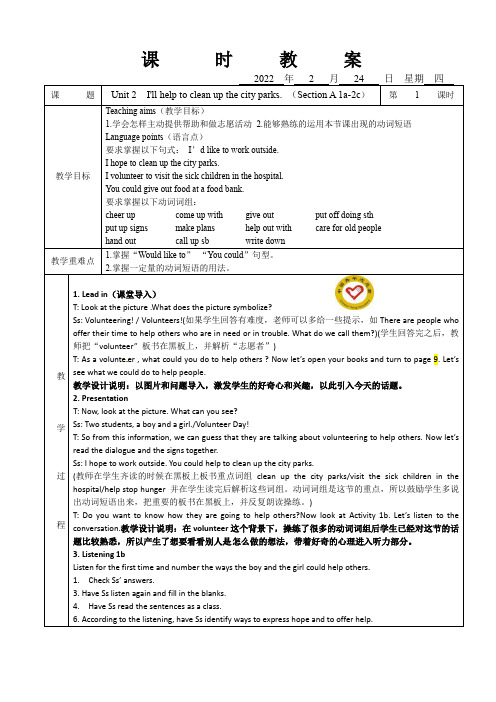
课时教案2022 年 2 月24 日星期四课题Unit 2 I'll help to clean up the city parks. (Section A 1a-2c)第 1 课时教学目标Teaching aims(教学目标)1.学会怎样主动提供帮助和做志愿活动2.能够熟练的运用本节课出现的动词短语Language points(语言点)要求掌握以下句式:I’d like to work outside.I hope to clean up the city parks.I volunteer to visit the sick children in the hospital.You could give out food at a food bank.要求掌握以下动词词组:cheer up come up with give out put off doing sthput up signs make plans help out with care for old peoplehand out call up sb write down教学重难点1.掌握“Would like to”“You could”句型。
2.掌握一定量的动词短语的用法。
教学过程1. Lead in(课堂导入)T: Look at the picture .What does the picture symbolize?Ss: Volunteering! / Volunteers!(如果学生回答有难度,老师可以多给一些提示,如There are people who offer their time to help others who are in need or in trouble. What do we call them?)(学生回答完之后,教师把“volunteer” 板书在黑板上,并解析“志愿者”)T: As a volunte er , what could you do to help others ? Now let’s open your books and turn to page 9. Let’s see what we could do to help people.教学设计说明:以图片和问题导入,激发学生的好奇心和兴趣,以此引入今天的话题。
人教版八年级英语下册第二单元集体备课
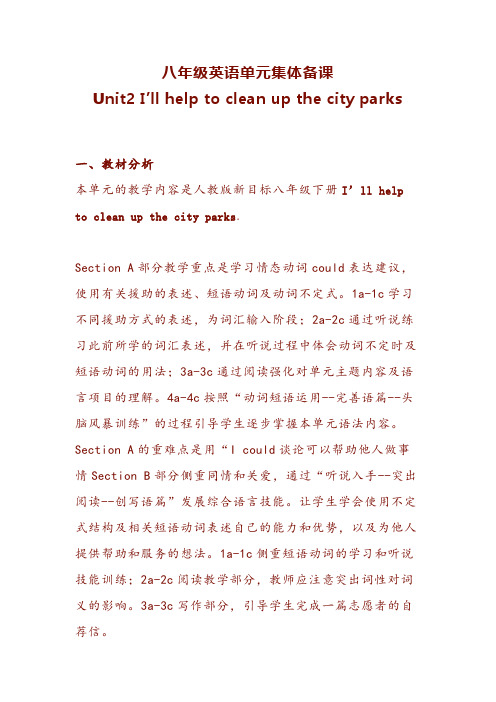
八年级英语单元集体备课Unit2 I’ll help to clean up the city parks一、教材分析本单元的教学内容是人教版新目标八年级下册I’ll help to clean up the city parks.Section A部分教学重点是学习情态动词could表达建议,使用有关援助的表述、短语动词及动词不定式。
1a-1c学习不同援助方式的表述,为词汇输入阶段;2a-2c通过听说练习此前所学的词汇表述,并在听说过程中体会动词不定时及短语动词的用法;3a-3c通过阅读强化对单元主题内容及语言项目的理解。
4a-4c按照“动词短语运用--完善语篇--头脑风暴训练”的过程引导学生逐步掌握本单元语法内容。
Section A的重难点是用“I could谈论可以帮助他人做事情Section B部分侧重同情和关爱,通过“听说入手--突出阅读--创写语篇”发展综合语言技能。
让学生学会使用不定式结构及相关短语动词表述自己的能力和优势,以及为他人提供帮助和服务的想法。
1a-1c侧重短语动词的学习和听说技能训练;2a-2c阅读教学部分,教师应注意突出词性对词义的影响。
3a-3c写作部分,引导学生完成一篇志愿者的自荐信。
二、学情分析:话题背景:本单元围绕“志愿者工作”这一话题展开,非常贴近学生实际生活。
经过3月5号学雷锋活动学生会有话可说并非常感兴趣。
知识背景:七年级情态动词can用法的学习、第一单元情态动词should陈述建议,已为本单元学习could表达建议打下语法基础.八年级上册第五单元已学过动词不定式做宾语,本单元将补充不定式作状语、宾补等用法。
短语动词则渗透到日常教学活动中。
大三、教学目标:本单元的教学目标:1、通过听说训练,能够用目标语言谈论帮助他人并交流参加志愿活动的感受。
2、能熟练运用不定式,用所学动词短语表达自己的想法。
3、根据问题,从听力或短文中快速获取信息。
4、通过学习志愿者帮助别人故事,激发孩子们积极参与做志愿者活动对学生进行情感上的教育。
人教版新目标八年级下册英语教案:Unit2WhatshouldIdo?
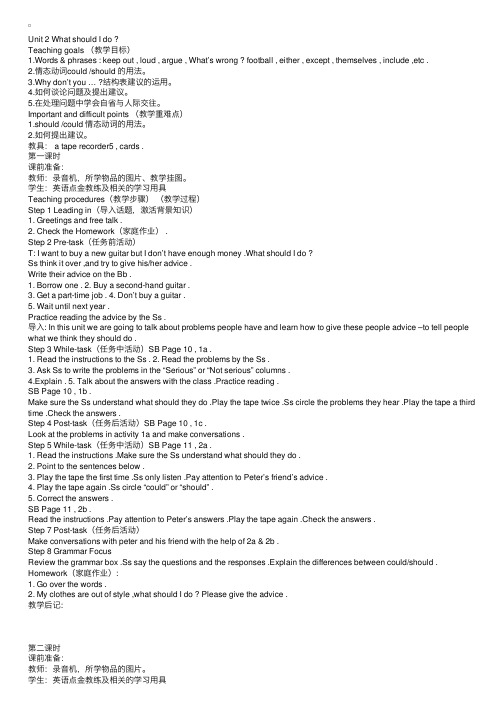
Unit 2 What should I do ?Teaching goals (教学⽬标)1.Words & phrases : keep out , loud , argue , What’s wrong ? football , either , except , themselves , include ,etc .2.情态动词could /should 的⽤法。
3.Why don’t you … ?结构表建议的运⽤。
4.如何谈论问题及提出建议。
5.在处理问题中学会⾃省与⼈际交往。
Important and difficult points (教学重难点)1.should /could 情态动词的⽤法。
2.如何提出建议。
教具: a tape recorder5 , cards .第⼀课时课前准备:教师:录⾳机,所学物品的图⽚、教学挂图。
学⽣:英语点⾦教练及相关的学习⽤具Teaching procedures(教学步骤)(教学过程)Step 1 Leading in(导⼊话题,激活背景知识)1. Greetings and free talk .2. Check the Homework(家庭作业) .Step 2 Pre-task(任务前活动)T: I want to buy a new guitar but I don’t have enough money .What should I do ?Ss think it over ,and try to give his/her advice .Write their advice on the Bb .1. Borrow one .2. Buy a second-hand guitar .3. Get a part-time job .4. Don’t buy a guitar .5. Wait until next year .Practice reading the advice by the Ss .导⼊: In this unit we are going to talk about problems people have and learn how to give these people advice –to tell people what we think they should do .Step 3 While-task(任务中活动)SB Page 10 , 1a .1. Read the instructions to the Ss .2. Read the problems by the Ss .3. Ask Ss to write the problems in the “Serious” or “Not serious” columns .4.Explain .5. Talk about the answers with the class .Practice reading .SB Page 10 , 1b .Make sure the Ss understand what should they do .Play the tape twice .Ss circle the problems they hear .Play the tape a third time .Check the answers .Step 4 Post-task(任务后活动)SB Page 10 , 1c .Look at the problems in activity 1a and make conversations .Step 5 While-task(任务中活动)SB Page 11 , 2a .1. Read the instructions .Make sure the Ss understand what should they do .2. Point to the sentences below .3. Play the tape the first time .Ss only listen .Pay attention to Peter’s friend’s advice .4. Play the tape again .Ss circle “could” or “should” .5. Correct the answers .SB Page 11 , 2b .Read the instructions .Pay attention to Peter’s answers .Play the tape again .Check the answers .Step 7 Post-task(任务后活动)Make conversations with peter and his friend with the help of 2a & 2b .Step 8 Grammar FocusReview the grammar box .Ss say the questions and the responses .Explain the differences between could/should . Homework(家庭作业):1. Go over the words .2. My clothes are out of style ,what should I do ? Please give the advice .教学后记:第⼆课时课前准备:教师:录⾳机,所学物品的图⽚。
新课标人教版八年级英语下册Unit 2 What should I do(1)

Unit 2 What should I do(1)单元教材分析学会should ,Why don’t you和could在英语中的习惯用法。
使用这些习惯用法,就自己生活、学习中存在的某些实际问题提出建议;拒绝、接受别人的建议。
在学习贴近学生生活实际的语言知识的同时,特别关注学生生活和学习中的真实困难和烦恼。
进一步引导学生对自我和周围世界进行比较客观的认识、评价,发展学生主动解决问题的自我意识和行为能力。
发展学生与人和谐交往的能力;培养在学生交流中寻求帮助。
既坚持自己观点、又听取别人建议。
单元总体目标1. The students will learn to talk about problems.2. The students can help people in trouble and how to give advice.3. Practice the sentences with “could, couldn’t, shouldn’t”.4. To learn the words and expressions about reading passage.单元重难点一览单元学情分析In this unit students learn to talk about problems and give advice. First make up a problem you might be having and write you could do about it. Secondly read the problem to the class again and help the class give advice using the words could, should, shouldn’t. In the end, make sentences with the words and write some letters or make conversations.单元教学建议Ask the students to read papers or magazines to find some problems the people have, then ask the students to make a chart with each problem. Ask some students to write a paragraph about the worst advice they ever got, and guess what the problem is. Maybe ask three or five students to work in group for a radio talk show where people call in for advice.单元课时分配Five periods第一课时教学内容1. To learn the words and expressions about this period.2.To talk about the problems serious or not for them in daily life.3.To learn how to describe the problems you have or how to help others to give him orher some advice.教学目标知识与能力1. Knowledge aims: Words and expressions; How to use should, could, shouldn’t;2. Ability aims: Express the good ideas to solve the problems;Help others when they are in trouble.过程与方法首先谈论生活中严肃或不严肃的事情;通过听力训练和口语表达学会如何表达自己的困难,如何给别人提建议等;通过谈论表达自己对有些困难的理解,提出个人不同的建议。
新人教版初中英语八年级下册Unit2教案
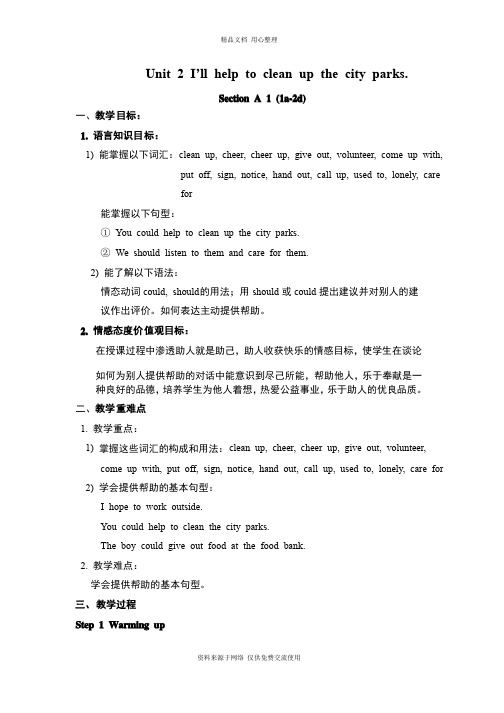
Unit 2 I’ll help to clean up the city parks.Section A 1 (1a-2d)一、教学目标:1. 语言知识目标:1) 能掌握以下词汇:clean up, cheer, cheer up, give out, volunteer, come up with, put off, sign, notice, hand out, call up, used to, lonely, care for 能掌握以下句型:① You could help to clean up the city parks. ② We should listen to them and care for them. 2) 能了解以下语法:情态动词could, should 的用法;用should 或could 提出建议并对别人的建议作出评价。
如何表达主动提供帮助。
2. 情感态度价值观目标:在授课过程中渗透助人就是助己,在授课过程中渗透助人就是助己,助人收获快乐的情感目标,助人收获快乐的情感目标,助人收获快乐的情感目标,使学生在谈论使学生在谈论如何为别人提供帮助的对话中能意识到尽己所能,如何为别人提供帮助的对话中能意识到尽己所能,帮助他人,帮助他人,乐于奉献是一种良好的品德,培养学生为他人着想,热爱公益事业,乐于助人的优良品质。
二、教学重难点m1. 教学重点:1) 掌握这些词汇的构成和用法:clean up, cheer, cheer up, give out, volunteer, come up with, put off, sign, notice, hand out, call up, used to, lonely, care for 2) 学会提供帮助的基本句型:I hope to work outside. You could help to clean the city parks. The boy could give out food at the food bank. 2. 教学难点:学会提供帮助的基本句型。
- 1、下载文档前请自行甄别文档内容的完整性,平台不提供额外的编辑、内容补充、找答案等附加服务。
- 2、"仅部分预览"的文档,不可在线预览部分如存在完整性等问题,可反馈申请退款(可完整预览的文档不适用该条件!)。
- 3、如文档侵犯您的权益,请联系客服反馈,我们会尽快为您处理(人工客服工作时间:9:00-18:30)。
stop doing sth.停止做某事Please stop speaking.请停止讲话
(2)stop to do sth.停下来去做另外一件事Please stop to talk.请停下来讲话
(3)stop sb. from doing sth. =keep sb from doing sth=prevent sb from doing sth阻止某人做某事
(4)try one’s best to do sth= do one’s best to do sth尽某人最大努力做某事
(二)、课堂检测:
用动词不定式填空,完成3c.
(三)、拓展延伸:
(四)、课堂反思:
备 注
Unit2Lesson4Section A 4a-4c
总课时编号:编写时间:月日执行时间:月日小组组别:
(二)语言学习。
【解析】come up with =think up想出
【短语】:think about考虑think of想起think over仔细考虑
【谚语】Think before you act三思而后行
2. (1) use v.使用→useful adj.有用的use up用完
Studying English is__________(use).
【解析3】at the age of在......岁的时候= when sb. was ... years old.
【解析4】try out尝试;实验try v试图,设法,努力
【拓展】(1)try on试穿(2) try to do sth努力做某事【侧重尽力做】
(3) try doing sth试图做某事【侧重尝试做】
(二)用动词不定式填空,完成3c。
(三)语言学习。
【解析1】give up放弃
give up doing sth=stop doing sth放弃做某事
【解析2】care for照看;照顾;照料
【拓展】care的短语总结
take care =be careful v.当心,小心take care of =look after v.照顾,照料,照看take care of处理,做完care for v.照顾,照看
4. He _____(spend) every morning _______ (do)some sports.
5. They plan ___________ (buy) a big house.
(三)、拓展延伸:
(四)、课堂反思:
备 注
Unit2Lesson2Section A 2a-2d
总课时编号:编写时间:月日执行时间:月日小组组别:
3.练习上面图片中的对话,然后使用1b中的信息编写对话,完成1c。
(三)语言学习
1. You could help to clean up the city parks.
1)help作动词,“帮助”。help sb.to do sth.意为:______________.
如:He often helps me to study English.
5.In the end, Grandma ________________ a good idea.
6.Would you please not _______________signs here?
7.We’re going to ______________a food bank to help hungry people.
clean up, put up, cheer up, set up, come up with, give out ,put off, call up
1.He has a lot of work to do, so he has to _______________going to the doctor.
2)he__.谢谢你的帮助。
2. sick和ill的用法区别
sick是形容词,"生病的",同义词是ill。区别在于sick在句中可做语和____语,而ill只能做语。如:His father was /sick yesterday, so he didn't go to work. Tom has looked after the sick girl for a week.。当ill意为"坏的,恶劣的"时,在句中可做定语。如:He is an ill child.
Unit2Lesson1Section A 1a-1c
总课时编号:编写时间:月日执行时间:月日小组组别:
小组组号:姓名:
一、学习目标:1.重点词汇用法及短语动词用法。
2.学会应用“I could…”、“I hope to…”等句型,向别人提供帮助。
二、重点难点:重点词汇用法及短语动词用法。
三、学习流程:
(一)、自主学习、合作探究:
一.回答问题:
1. Do you think volunteering is great?
2. What will you do if you are a volunteer? Please give some examples.
2.翻译下列词组:
1.打扫________ 2.分发________________ 3.使高兴;振奋____________
homeland n祖国hometown n家乡homework家庭作业
homeless adj.无家可归的home-made adj.自制的
careless粗心的hopeless没有希望的
helpless无助的useless没有用的
be home to sb. = be the home of sb.是某人的家
8. I’ll ________you________ as soon as I come back.
(三)、拓展延伸:
(四)、课堂反思:
备 注
Unit2Lesson3Section A 3a-3c
总课时编号:编写时间:月日执行时间:月日小组组别:
小组组号:姓名:
一、学习目标:1.重点词汇用法及短语动词用法。
(三)用方框中所给单词的正确形式填空,完成4b,朗读短文,勾画出其中的重点短语。
(四)语言学习。
【解析1】home n.家→homeless adj.无家可归的
be home to…= be the home of sb.成为…家园
a homeless boy一个无家可归的男孩
【拓展】由home构成的合成词:
(5) be used to do sth被用来做某事=be used for doing sth
6.alone / lonely辨析:(1)alone = by oneself adj.单独的,指无人陪伴的客观事实
(2)lonely①指人孤独的,寂寞的,强调主观感受;②也可指某个地方是荒凉的
(二)、课堂检测:从方框中选择恰当的词组,并用其适当形式填空。
(2) use sth to do sth用某物做某事We use Internet __________(find) information.
(3) used to do sth过去常常做某事,表示过去做过的事现在已经不做,只用于过去时态。
(4) be /get used to doing sth习惯于做某事
4.sick children 5.at the food bank 6.after-school study program
【合作探究】
一看课本1a,看图片中你能帮助别人的方式。然后列出其他方式,完成1a。
二听读说训练:
1.听一听,填一填,完成1b。
2.朗读1b,勾画有用的表达法: clean up;;cheer up; give out; at the food bank
7.推迟______________ 8.闲暇时间________ 9.考虑___________________
10.制定计划11.无家可归的人12.停止做某事
(二)自读、小组内互读单词和词组。
二、【合作探究】
(一)朗读并翻译Grammar Focus里的句子,注意其中几个短语动词的用法。
(二)用表格中的短语动词填空,完场4a。
(二)、课堂检测:
用所给词的适当形式填空。
1. Let’s cheer _________ (they)up, ok?
2. I’d like _____________ (visit)my English teacher tomorrow.
3. I’ll feel good about _______ (help)the old people.
(4)can’t stop doing sth.忍不住做……
( )①Seeing their teacher ____ into the classroom, they stopped _____ at once.
A. walk; tellingB. entering; to speak C. enter; to tellD. walking; talking
(2)Why do Mario and Mary volunteer to help others?
(3)What do they say about volunteering?
2.细读文章,完成以下表格。
WhoWhenWhereWhat do they do?
Mario
Mary
3.再读文章,勾画出其中的重点短语。
小组组号:姓名:
一、学习目标:1.重点词汇用法及短语动词用法。
2.could向他人提建议,动词短语的区别
二、重点难点:could向他人提建议,动词短语的区别,角色扮演
